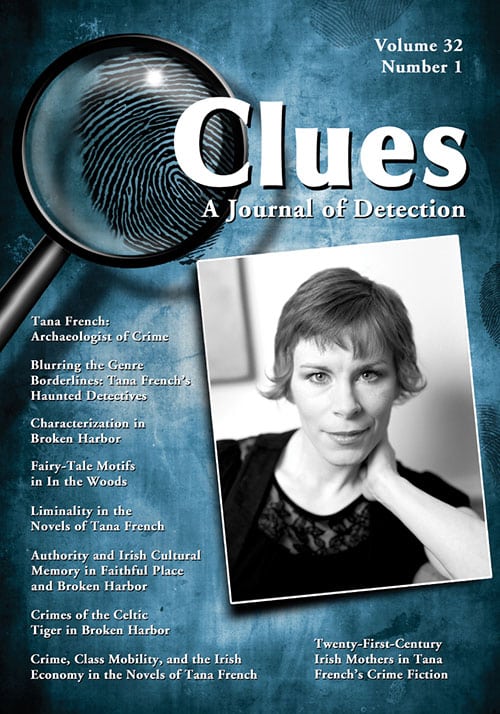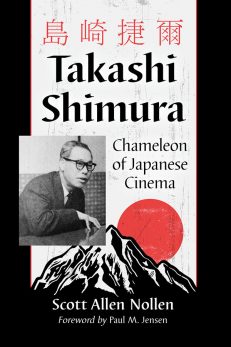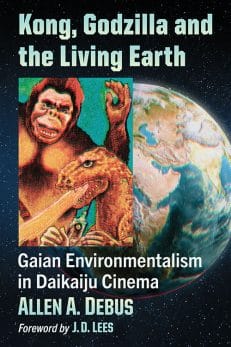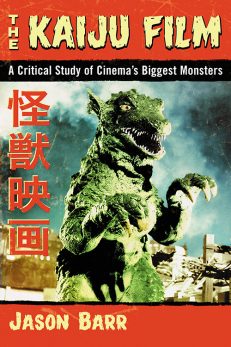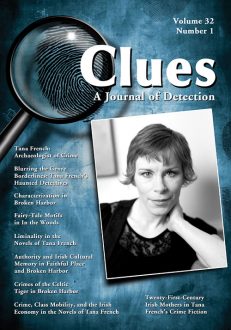Clues: A Journal of Detection, Vol. 32, No. 1 (Spring 2014)
Print Back Issue$30.00
In stock
About the Book
BACK ISSUE
This is a single back issue only. To order a current subscription, or for more information, please visit the journal’s web page at CluesJournal.com. Back issues from earlier volumes of Clues are available for order subject to availability. Also, single issues of the current volume may be ordered one at a time. Individuals may order back issues directly from our online catalog, and the charge for individuals is $30 (excluding postage). Issues from Volume 33 to the present are also available in ebook format on Kindle, Nook and Google Play.
The charge for single issues for institutions is $75 per issue (excluding postage). If your institution requires a back issue, please contact us to order at the appropriate rate.
About the Author(s)
Bibliographic Details
Executive Editor Janice M. Allan
Managing Editor Elizabeth Foxwell
Consulting Editor Margaret Kinsman
Format: softcover (7 x 10), back issue
Pages: 116
Bibliographic Info:
Copyright Date: 2014
ISSN 0742-4248
Imprint: McFarland
Table of Contents
Theme Issue: Tana French and Irish Crime Fiction
Guest Editor: Rachel Schaffer
A Debt Acknowledged: Clues Founding Editor Alice Maxine “Pat” Browne
Nancy Ellen Talburt 5
The author pays tribute to Clues founding editor Alice Maxine “Pat” Browne, who died in December 2013.
Introduction: Tana French and Irish Crime Fiction
Rachel Schaffer 9
The guest editor of this Clues theme issue on Tana French and Irish crime fiction discusses the growing popularity of Irish crime fiction, with Tana French as a prime example, and overviews the articles included in the issue.
Blurring the Genre Borderlines: Tana French’s Haunted Detectives
John Teel 13
In each of her mysteries, Tana French presents a different detective-narrator, and all of them are “haunted” by traumatic events from their childhoods or teen years. Through this use of “haunting,” French blurs genre “borderlines” by mixing the elements of the police procedural with, essentially, an aura of the gothic.
Unhappily Ever After: Fairy-Tale Motifs in Tana French’s In the Woods
Sarah D. Fogle 22
In her first novel, In the Woods, Tana French makes sustained use of various fairy-tale motifs and conventions to illuminate her characters and their relationships as the murder investigation unfolds.
Tana French: Archaeologist of Crime
Rachel Schaffer 31
The parallels between archaeology and detection provide a framework for the way the protagonists in Tana French’s novels work. Both disciplines follow the same general stages of surveying the scene, excavating information, and analyzing and interpreting results to shed light on the effects of past events on the lives of contemporary people.
Vision and Blind Spots: Characterization in Tana French’s Broken Harbor
Christine Jackson 40
Obsessive watching is at the center of Tana French’s Broken Harbor. A stalker’s voyeurism shapes the case while police surveillance both conceals and unmasks detective protagonist Michael “Scorcher” Kennedy. French projects an actor’s stage background onto the novelist’s page to manipulate narrative distance and reconfigure detective novel conventions.
Liminality in the Novels of Tana French
Mimosa Summers Stephenson 51
In Tana French’s mysteries, the murder victims die at crucial turning points in their lives, and the detectives find themselves on the edge, neither in nor out, of the cases they investigate. The protagonists become involved personally and pass through liminal zones that leave them altered when the novels end.
Twenty-First-Century Irish Mothers in Tana French’s Crime Fiction
rosemary erickson johnsen 61
Tana French’s three novels narrated by male detectives, In the Woods, Faithful Place, and Broken Harbour, reveal an intersection between crime fiction and the Irish literary tradition. Tropes of feminine imagery—particularly of the maternal—are implicated in the personal and professional failures of the narrators, and are part of French’s exploration of contemporary Ireland.
Murder in the Ghost Estate: Crimes of the Celtic Tiger in Tana French’s Broken Harbor
Shirley Peterson 71
In Tana French’s fourth novel, Broken Harbor, the crimes of Celtic Tiger excess are interrogated in a deracinated ghost estate, where the desire for prosperity results in dire consequences for a young family, belying the notion that Ireland’s troubled past was well removed from its upwardly mobile present.
Authority and Irish Cultural Memory in Faithful Place and Broken Harbor
Maureen T. Reddy 81
Tana French’s two most recent novels, Faithful Place and Broken Harbor, examine both the consequences of widespread loss of belief in any sort of authority in Ireland and some of the radical shifts in Irish cultural memory during the Celtic Tiger period and its aftermath.
“Built on Nothing but Bullshit and Good PR”: Crime, Class Mobility, and the Irish Economy in the Novels of Tana French
Moira E. Casey 92
Tana French’s novels demand serious literary attention for their social realist depiction of the cultural and economic impact of the Celtic Tiger economy and its recent crash. All four novels criticize Celtic Tiger culture, present the pre–Celtic Tiger past ambivalently, and represent the challenges of economic class mobility in contemporary Ireland.
BOOK REVIEWS
William Stephens Hayward. Revelations of a Lady Detective. Ellen F. Higgins 103
Arthur Conan Doyle, auth.; Jon Lellenberg, Daniel Stashower, and Rachel Foss, eds. The Narrative of John Smith. Christopher Pittard 105
Spiro Dimolianis. Jack the Ripper and Black Magic: Victorian Conspiracy Theories, Secret Societies and the Supernatural Mystique of the Whitechapel Murders. Rita Rippetoe 108
Emelyne Godfrey. Femininity, Crime and Self-Defence in Victorian Literature and Society: From Dagger-Fans to Suffragettes. Gianna Martella 109
William Luhr. Film Noir. Mary P. Freier 111
Call for Papers: Re-Evaluating Patricia Highsmith 113
Author Guidelines are on page 115
Book Reviews & Awards
- “Clues is a must-have for readers and writers of crime fiction. Scholarly, thought-provoking, wide-ranging in its topics, Clues covers the crime and thriller map.”—Sara Paretsky
- “A. Conan Doyle, notoriously resentful of Sherlock Holmes’s success, liked to scorn ‘police romances’ as less significant and worthy of his talents than his other literary work. If he could have read Clues, the thinking mystery reader’s journal, he would surely have felt differently—and learned much he never realized himself about even his own landmark contribution to the genre, from which so much else by others has flowed.”—Jon Lellenberg, U.S. agent for the Arthur Conan Doyle estate
- “I love reading Clues. Every issue provides thought-provoking, well-researched articles. The variety and scope of the material found in Clues makes an unparalleled, ongoing contribution to our understanding of the role of crime fiction in our culture, and the genre’s reflection of its time and society.”—Jan Burke, Edgar-winning author of The Messenger (2009)
- “Clues is an important journal. It carries the torch of tradition that is the backbone of detective fiction. It goes below the surface and gets to the heart of what makes the genre so fascinating and valid today”—Michael Connelly, author of the Harry Bosch novels, including The Overlook (2007)
- “for erudite and fascinating truths about mysteries, follow the clues to Clues, the scholarly journal that is an essential resource for every serious student of the mystery”—Carolyn Hart, author of Death Walked In (2008)
- “with scholarship ranging from Poe to Peters, nothing beats Clues”—Joan Hess, author of Mummy Dearest (2008).

